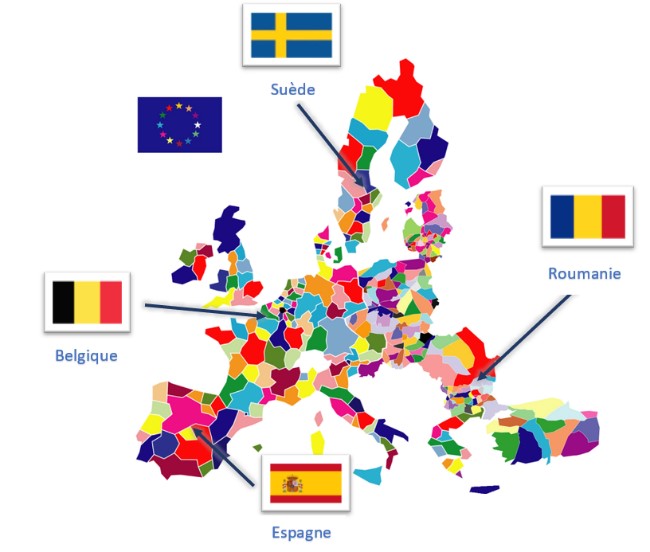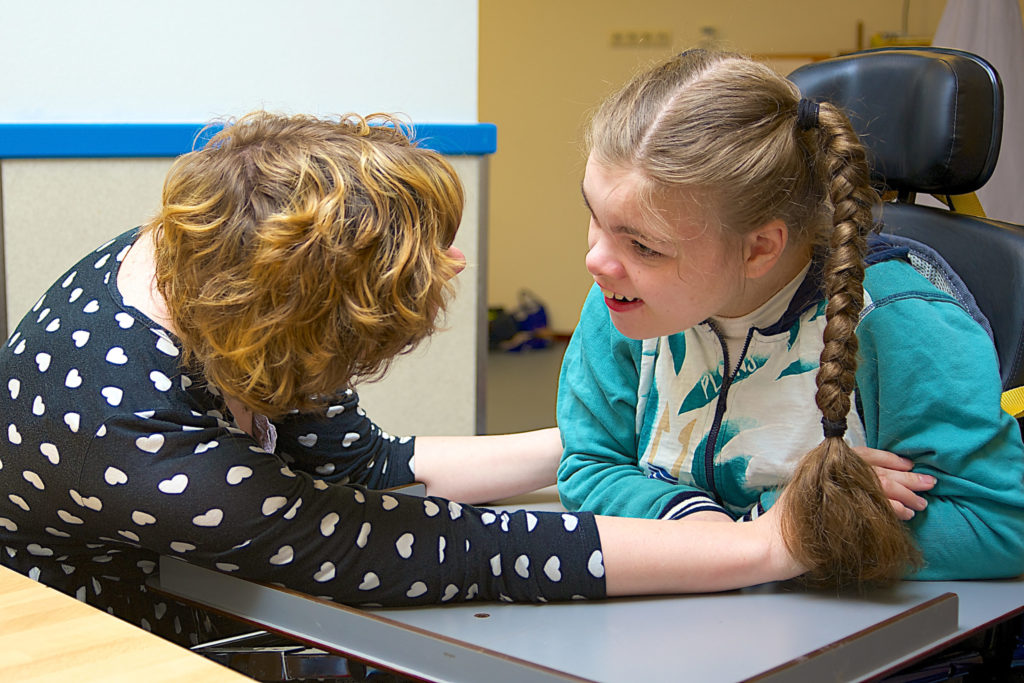“HOW ARE OUR NEIGHBOURS ADDRESSING THIS ISSUE?”
DEVELOPING THE SKILLS OF PEOPLE WITH SPECIFIC LANGUAGE ACCESS NEEDS:
Context and objectives
Since 2016, the parents of former and current pupils at the Centre pour enfants pluri-handicapés, as well as its team members, and those of the Centre de ressources Robert Laplane, have been working with the aim of raising awareness on the specific needs for access to language in children of this demographic. This has been undertaken in order to promote and disseminate the “mediation for access to language and elaboration of sense” approach, co-constructed with the Centre pour enfants pluri-handicapés. Having tested this innovative approach over a number of years, the parents and professionals want to try transferring it at the European level, and develop a multimodal skills-development training programme (experiential, in-person and distance learning) for professionals with the partners. In addition, the young adults and parents concerned want to recount their personal experiences of this approach and its impacts on their social participation.

Project proceedings
The first stage, initiated in June 2016, aimed to create a pedagogical toolkit. The introduction number of tools and, above all, a clarification of the approach’s aims and philosophy will make up the contents of this training module.
The second stage of the project rested in an exploratory study. With the help of Louis Bertrand – a researcher who had previously worked with the Centre de ressources Robert Laplane on the question of rare disability – the objective was to analyse the various pedagogical approaches and training apparatuses offered to care professionals and helpers, as well as the variety of ways in which care and support responses are contemplated, within each of the regions studied. The project also intended to scout for European partners who would be likely to participate in the task of assembling a training programme. Certain partners are aware of the issue in question, and have developed potentially innovative practices. Others, however different their work-cultural background may be (e.g. training bodies, adult care centres, regional managers, and software developers), will nonetheless contribute to the project.
This exploratory study thus gives leverage to the co-construction dynamics of another, larger project. This will aim for discovery, inspiration, and exchange regarding the support and training apparatuses for care professionals and helpers looking after people with multiple disabilities who have serious difficulties communicating with their entourage and, more specifically, young deaf adults with associated disorders.
The study trips involved 4 countries (Romania, Belgium, Sweden, and Spain) and took place between April and June 2018. The visits undertaken concerned institutions or individuals caring for deaf people (children or adults) with multiple disabilities. These visits consisted in both observing a variety of situations and testing the possibility of future collaboration.

Methodology and results
The log books kept by each participant enabled a comparative analysis on 4 topics:
- Inclusive policy, the recomposition the care and support offer, and their impact on the care and support of deaf people with associated disorders
- The linguistic projects of the different sites visited, and their appropriateness for a demographic with substantial difficulty in communication
- The training of professionals and helps
- The space given to the participation of care-recipients and families
Indeed, one of this demographic’s difficulties lies in young people’s need to be able to communicate with their peers and have the space to do so. Heightened technical facilities are also necessary, especially in terms of communication. The classical modalities of inclusion in nearby ordinary education classes also need rethinking. What’s more, disorders associated with deafness are not always detected, and not always investigated. More often than not, in France as elsewhere, medical diagnosis, functional assessment, and remediation strategies are rarely linked together. Getting up to speed with the entanglement of possible disorders and their repercussions on development appears as an essential task. These study trips, which often feed back on observations already made in France, have shown the urgency of formalising the approach developed over the last two decades at the Centre pour enfants pluri-handicapés and the Centre de ressources Robert Laplane. They have also prompted an intersection of experiences and expertise between partners, so as to deepen thought on the communication approach and design training programmes for professionals and families.
FIND OUT MORE
- Download the exploratory study report
- Poster presenting the objectives, observations, and recommendations resulting from the various study trips – See the poster
- PowerPoint presentation on the project context – See the presentation
- This project was financed by the CNSA within the framework of the “Innovation 2017” call for proposals – See the CNSA’s article on these pro
